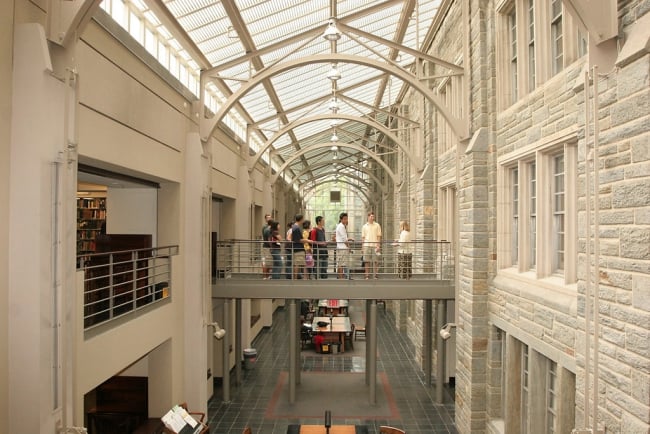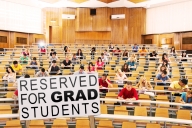You have /5 articles left.
Sign up for a free account or log in.

Princeton University
When Princeton University announced it had settled litigation with area homeowners who had argued it is a profit-making institution in order to challenge its exemption from property taxes, it appeared to be paying millions of dollars to clear long-lingering uncertainty.
But the agreement, announced Oct. 14, leaves key legal issues unresolved in New Jersey. Although the university did not admit its currently exempt property should be taxed, a court did not affirm its tax exemptions, either.
That could foreshadow additional challenges to research universities in the state -- challenges many think could be copied elsewhere in the country as taxpayers or revenue-strapped municipalities search for sources of cash. And the lawyer who filed the Princeton case says the homeowners he represented could bring another lawsuit in six years.
Within New Jersey, a key development in the case took leverage from Princeton University. A judge ruled that the burden of proof for tax-exempt status was on Princeton University, meaning it would have been required to prove itself qualified for property tax exemptions it was already receiving. That’s a major difference from the homeowners bringing the suit having to prove that Princeton did not deserve tax breaks. It’s also a potentially slow and expensive process for the university.
On a larger scale, it’s not yet clear whether challenges to college and university tax exemptions will become common outside of New Jersey, although politicians have eyed the possibility in several states. But the Princeton settlement plainly fits into an era in which college and university finances, tax exemptions and operations are challenged from all sides.
The settlement comes more than five years after several residents sued Princeton over its tax-exempt status. Like other nonprofit institutions, Princeton is exempt from paying property taxes on much of its property. It does, however, pay taxes on some commercial properties that don’t qualify for exemption -- like a movie theater it owns -- and on others it voluntarily keeps on the tax rolls, like graduate student housing. It also makes voluntary contributions to local municipal government.
Princeton University says it is the largest property taxpayer in the Borough of Princeton municipality, with an $11.1 million property tax bill. Residents, however, argued that they have had to pay more in taxes to compensate for money the university should be paying on exempt property. The lawyer representing them has said that Princeton’s tax bill would be in the $30-40 million range if it paid taxes on all of its property.
In 2011, residents first filed their litigation to challenge Princeton’s status as a nonprofit operation. Additional residents later joined the action, which claimed Princeton University earns millions of dollars in patent royalty income that is then distributed to faculty. The action also argued the university partakes in other commercial operations.
“It shares profit with faculty; engages in profit-seeking conduct through its patent, copyright and trademark licensing businesses; sells the use of its scientific and engineering facilities to outside commercial entities; maintains an industrial associates program and other programs in which it makes available its facilities to commercial use; operates venture capital businesses; operates retail businesses; operates a commercial real estate business and a residential real estate rental business; operates a profit-seeking hedge fund operation and other profit-based investment operations; operates a[n] office and hotel development business, private mortgage banking, commercial television, among other activities,” one complaint from 2015 said.
“Since at least 2005 Princeton University has distributed approximately $150 million in profits to faculty above and beyond their normal compensation and continues to do so,” it continued.
Princeton’s Office of Technology Licensing and Intellectual Property reported patent license income rising from $95.9 million in 2010 to $115.2 million in the 2011 fiscal year, the last year in which it broke out the line in its annual research report. Most of the increase was credited to growth in sales of the anticancer drug Alimta, which is licensed to Eli Lilly and Co. Distributions to inventors rose from $28.9 million to $34.8 million.
Many colleges periodically tussle with localities over whether a given building should be tax-exempt, based on operations there. But the breadth of the challenge to Princeton's status was unusual -- and therefore of concern to research universities nationwide.
Princeton maintained that it complies with federal law when faculty member research leads to patents that are then transferred to companies. It argued the cost of supporting research was beyond any revenue generated and pointed out that it pays substantial property taxes.
The university also argued that it provides services that would otherwise be picked up by municipal authorities, like collecting trash, employing police officers and keeping up private roads that are open to the public.
Still, Tax Court Judge Vito Bianco refused to dismiss the litigation, which ultimately pitted Princeton University and the Borough of Princeton, which granted the university tax-exempt status, against nearly 30 residents. Then in November of last year the judge said the university held the burden of proof. That raised major concerns at the university and for others in the New Jersey nonprofit space.
The Center for Non-Profits, a New Jersey state association of nonprofits that filed an amicus brief supporting the university, said it worried about opening the door to future challenges to nonprofits’ tax exemptions.
“The center is deeply concerned that this standard, which appears to have little substantiation in existing case law, would make all nonprofit property owners highly vulnerable to challenges from disgruntled residents that would be extremely costly and time-consuming to defend, siphoning scarce resources,” it wrote on the development.
Princeton University, meanwhile, anticipated going building by building to defend its property tax exemptions. It projected that process to take weeks, potentially pushing the trial’s completion date into 2017.
Instead it opted to settle the case. The deal it reached, which was announced just three days before the suit was set to go to trial, will have the university paying $2 million in 2017 and $1.6 million per year for five subsequent years to fund payments to Princeton homeowners who receive benefits under New Jersey’s Homestead program for low- and moderate-income homeowners. The benefit will pay approximately $2,200 per homeowner. Some of the money will also go to a nonprofit organization providing need-based scholarships for graduates of Princeton High School who attend postsecondary institutions other than Princeton.
In addition, the university is set to contribute $416,700 per year from 2017 to 2019 to the Witherspoon Jackson Development Corp., a nonprofit organization that will direct the funds to housing and related needs for economically disadvantaged residents in Princeton. Plus, the university will make $3.48 million in annual voluntary payments to its local municipality in 2021 and 2022. That’s the same amount it’s set to contribute in 2020 under an existing seven-year agreement that had been set to end that year.
Princeton President Christopher L. Eisgruber said the university felt the settlement payments were a better use of funding than continuing litigation. The university declined to discuss in depth the process behind its decision to settle the case. But a spokesman, John Cramer, said it would have expected to have its property tax exemption eligibility confirmed had the case gone to trial.
"New Jersey’s Constitution and decades of state policy establish that nonprofit educational institutions serve public purposes and are entitled to property tax exemption so they can devote their resources to their educational and research missions,” Cramer said in an email. “This is exactly what Princeton does.”
The lawyer representing the homeowners disagreed, though. Bruce Afran believes he would have won the case but took the settlement because it helped homeowners.
“The reason for starting this lawsuit, originally, was to stabilize the tax base, to protect the economically disadvantaged homeowners that live here,” Afran said. “That’s why we took this.”
Afran will not rule out bringing similar lawsuits in the future, in New Jersey or elsewhere. The Princeton settlement covers a six-year time frame, but homeowners could return to court at the end of that period, he said. They might do so unless the university puts more money on the table.
“I don’t know what will happen in six years,” Afran said. “If Princeton’s business commercialization continues to grow and there’s no permanent solution, I am confident the litigation will begin again -- if not with me, then with someone else.”
Afran insists he has no ill will toward the academic world or intent to challenge its existence. Princeton negotiated fairly, he said, adding that now Princeton is doing more to support its local tax base than most other comparable universities.
Afran rejected several arguments for the university keeping its tax-exempt status, including the argument that it pays property tax on some of its buildings that are deemed commercial.
“That’s not the point,” he said. “The point is they’re running those out of their exempt buildings. The management comes through the university’s executive staff. There’s no way to segregate that, because the president himself is responsible for that management. So is the Board of Trustees.”
Major research institutions are vulnerable to similar challenges across the country, Afran believes. Smaller institutions that aren’t trying to commercialize research have become different from large research institutions pursuing widespread commercialization, he said.
“This is going on in major research universities all over the country,” Afran said. “There’s virtually no way to segregate the academic science and the commercial science. They’re all merged.”
Universities inside and outside of New Jersey have followed the case with concern, according to John B. Wilson, president and CEO of the Association of Independent Colleges and Universities in New Jersey. Yet it remains to be seen whether others pick up on the settlement.
In large part, that’s because the key question in the case has not been settled -- whether Princeton researchers receiving royalties from their research were equivalent to stockholders receiving dividends, Wilson said.
“What precedent it sets remains to be seen,” he said.
In New Jersey, the settlement comes at a time of intense pressure from high property tax rates, tight municipal budgets and a trend toward tax-exemption litigation. The topic of tax exemption has grown in prominence since a 2015 case finding Morristown Medical Center was not entitled to a tax exemption on most of its property.
In that case, Bianco -- the same judge overseeing the Princeton case -- found the hospital did not meet the legal test for operating as a charitable nonprofit organization. The judge cited several reasons in his finding, including compensation levels similar to the for-profit sector, that private physicians earned income on hospital property and that the hospital was similar in function to for-profit hospitals. He also said the hospital did not show separation between for-profit and nonprofit activity. The hospital later reached a settlement to pay property taxes on about a quarter of its property plus penalties over a decade. “New Jersey has kind of led the way in tax-exemption litigation,” said Michael Paff, a New Jersey-based lawyer who specializes in real estate matters including property tax exemptions. “The decision of Morristown hospital, that’s now snowballed into an issue where upwards of 35 other townships in New Jersey have filed litigation against their local hospitals. That’s very concerning.”
Different pieces of legislation have been drafted to address the state’s trend of property tax legislation. They have yet to result in changes to the law.
New Jersey legislators passed a law this year that would have protected the state property tax exemption for nonprofit hospitals that have profit-making activities while requiring them follow a formula for making mandatory fees to local municipalities. Governor Chris Christie pocket vetoed the measure in January. Other legislation has been drafted to limit the ability of third parties like homeowners to challenge nonprofits’ property tax exemptions, as happened in the Princeton case.
Without legislative changes, many worry about future suits against universities. In theory, those suits would not have to be won to have an impact. Legal action can provide leverage for parties trying to extract payment in lieu of tax, or PILOT agreements, from institutions to municipalities.
“I think in many ways, all these cases are tried in public opinion,” said Daphne A. Kenyon, an economist and resident fellow in tax policy at the Lincoln Institute of Land Policy in Cambridge, Mass., who has studied PILOT agreements and is a former member of the New Hampshire Board of Education. “I think if I was the president of the university, I would make sure I was prepared for some cases like this and made sure I had my arguments stacked up and also made sure to keep town-gown relations cordial.”
Keeping tax disputes amicable is a key recommendation, Kenyon said. She believes it is beneficial if institutions can come to agreements for the long term, which can reduce the relative cost of negotiations.
The situation in New Jersey might not set off a wave of litigation against colleges and universities around the country, Kenyon said. Legal differences could stand in the way.
“The property tax exemption for nonprofits goes back to the earliest history of our country, and it existed before we even had an income tax,” Kenyon said. “When you look at it, the detail and the difference from state to state are mind-numbing.”
Homeowners in many locations won’t have the resources to bring a suit, either. The Princeton suit was only able to proceed because Eleanor Lewis, a public interest lawyer and former assistant commissioner of the New Jersey Department of Insurance, left money in her estate for the cause, Afran said.
Still, some worry that the debate has highlighted the notion that universities and nonprofits should pay their fair share of taxes toward municipal services. That idea could put financial stress on small institutions while overlooking the contributions they make, said Linda Czipo, president and CEO of the Center for Non-Profits in New Jersey.
“Our concern is it completely disregards what nonprofits of all sizes and types do contribute to the well-being of localities and regions, whether it’s economically or programmatically or socially,” she said. “It’s not a one-sided equation.”








